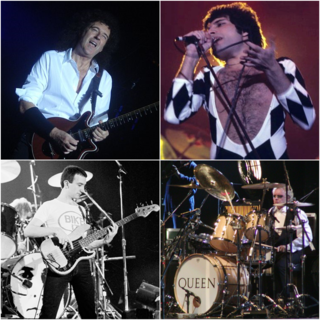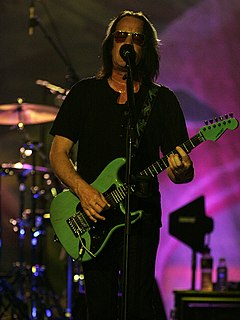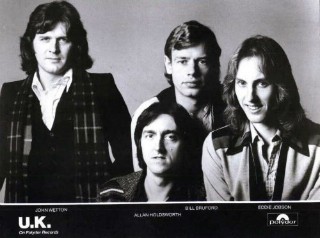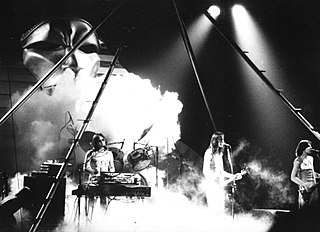 W
WThe Alan Parsons Project were a British rock band active between 1975 and 1990, whose core membership consisted of Alan Parsons and Eric Woolfson. They were accompanied by a varying number of session musicians and some relatively consistent session players such as guitarist Ian Bairnson, arranger Andrew Powell, bassist and vocalist David Paton, drummer Stuart Elliott, and vocalists Lenny Zakatek and Chris Rainbow. Parsons was an audio engineer and producer by profession, but also a musician and a composer. A songwriter by profession, Woolfson was also a composer, a pianist, and a singer. Almost all the songs on the Project's albums are credited to "Woolfson/Parsons".
 W
WKevin Ayers was an English singer-songwriter who was a major influential force in the English psychedelic movement. Ayers was a founding member of the pioneering psychedelic band Soft Machine in the mid-1960s, and was closely associated with the Canterbury scene. He recorded a series of albums as a solo artist and over the years worked with Brian Eno, Syd Barrett, Bridget St John, John Cale, Elton John, Robert Wyatt, Andy Summers, Mike Oldfield, Nico and Ollie Halsall, among others. After living for many years in Deià, Majorca, he returned to the United Kingdom in the mid-1990s before moving to the south of France. His last album, The Unfairground, was released in 2007. The British rock journalist Nick Kent wrote: "Kevin Ayers and Syd Barrett were the two most important people in British pop music. Everything that came after came from them."
 W
WThe Buggles were an English new wave band formed in London in 1977 by singer and bassist Trevor Horn and keyboardist Geoffrey Downes. They are best known for their 1979 debut single "Video Killed the Radio Star", which topped the UK Singles Chart and reached number one in 15 other countries.
 W
WChurch of the Cosmic Skull are a British rock band from Nottingham.
 W
WCrack the Sky is an American progressive rock band formed in Weirton, West Virginia, in the early 1970s. In 1975, Rolling Stone declared their first album the "debut album of the year", and in 1978, Rolling Stone Record Guide compared them to Steely Dan. Their first three albums charted on the Billboard 200. In 2015, their debut album was ranked number 47 in the Rolling Stone list of 50 Greatest Prog Rock Albums of All Time. The band continues to release albums and perform to a small but devoted fan base to this day.
 W
WThe Electric Light Orchestra (ELO) are an English rock band formed in Birmingham in 1970 by songwriters-multi-instrumentalists Jeff Lynne and Roy Wood with drummer Bev Bevan. Their music is characterised by a fusion of Beatlesque pop, classical arrangements and futuristic iconography. After Wood's departure in 1972, Lynne became the band's sole leader, arranging and producing every album while writing nearly all of their original material. For their initial tenure, Lynne, Bevan and keyboardist Richard Tandy were the group's only consistent members.
 W
WBrian Peter George St John le Baptiste de la Salle Eno is an English musician, record producer, visual artist, and theorist best known for his work in ambient music and contributions to rock, pop and electronica. A self-described "non-musician", Eno has helped introduce unique conceptual approaches and recording techniques to contemporary music. He has been described as one of popular music's most influential and innovative figures.
 W
WGenesis are an English rock band formed at Charterhouse School, Godalming, Surrey, in 1967. The most commercially successful and longest-lasting line-up consists of keyboardist Tony Banks, bassist/guitarist Mike Rutherford and drummer/singer Phil Collins. Other former members were original lead singer Peter Gabriel, and guitarists Anthony Phillips and Steve Hackett. The band moved from folk music to progressive rock in the 1970s, before moving towards pop at the end of the decade.
 W
WKraftwerk is a German band formed in Düsseldorf in 1970 by Ralf Hütter and Florian Schneider. Widely considered as innovators and pioneers of electronic music, they were among the first successful acts to popularize the genre. The group began as part of West Germany's experimental krautrock scene in the early 1970s before fully embracing electronic instrumentation, including synthesizers, drum machines, and vocoders.
 W
WThe Lemon Twigs are an American rock band from Long Island, New York, fronted by brothers Brian and Michael D'Addario. Both brothers are vocalists, songwriters and multi-instrumentalists, and are joined live by Daryl Johns on bass, Tommaso Taddonio on keyboards and Andres Valbuena on drums.
 W
WAlan Parsons is an English audio engineer, songwriter, musician, and record producer. Parsons's father was Parsons Code developer Alexander Denys Herbert (Denys) Parsons, his mother, Jane Kelty (Kelty) MacLeod. Parsons's great-grandfather was the notable stage actor and theatre manager Herbert Beerbohm-Tree, and the film actor Oliver Reed was a first cousin once removed, although they never met.
 W
WQueen are a British rock band formed in London in 1970. Their classic line-up was Freddie Mercury, Brian May, Roger Taylor and John Deacon (bass). Their earliest works were influenced by progressive rock, hard rock and heavy metal, but the band gradually ventured into more conventional and radio-friendly works by incorporating further styles, such as arena rock and pop rock.
 W
WRenaissance are an English progressive rock band, best known for their 1978 UK top 10 hit "Northern Lights" and progressive rock classics like "Carpet of the Sun", "Mother Russia", and "Ashes Are Burning". They developed a unique sound, combining a female lead vocal with a fusion of classical, folk, rock, and jazz influences. Characteristic elements of the Renaissance sound are Annie Haslam's wide vocal range, prominent piano accompaniment, orchestral arrangements, vocal harmonies, acoustic guitar, bass guitar, synthesiser, and versatile drum work. The band created a significant following in the northeast United States in the 1970s, and that region remains their strongest fan base.
 W
WRoxy Music were an English rock band that was formed in 1970 by Bryan Ferry—who became the band's lead singer and main songwriter—and bass guitarist Graham Simpson. Alongside Ferry, the other longtime members were Phil Manzanera (guitar), Andy Mackay, and Paul Thompson. Other members included Brian Eno, Eddie Jobson, and John Gustafson (bass). Although the band took a break from group activities in 1976 and again in 1983, they reunited for a concert tour in 2001, and toured together intermittently over the next few years. Ferry frequently enlisted band members as session musicians for his solo releases.
 W
WTodd Harry Rundgren is an American multi-instrumentalist, singer, songwriter, and record producer who has performed a diverse range of styles as a solo artist and as a member of the band Utopia. He is known for his sophisticated and often unorthodox music, his occasionally lavish stage shows, and his later experiments with interactive entertainment. He also produced music videos and was an early adopter and promoter of various computer technologies, such as using the Internet as a means of music distribution in the late 1990s.
 W
WAlastair Ian Stewart is a Scottish singer-songwriter and folk-rock musician who rose to prominence as part of the British folk revival in the 1960s and 1970s. He developed a unique style of combining folk-rock songs with delicately woven tales of characters and events from history.
 W
WSupertramp were an English rock band formed in London in 1970. Marked by the individual songwriting of founders Roger Hodgson and Rick Davies, they are distinguished for blending progressive rock and pop styles and for a sound that relied heavily on Wurlitzer electric piano. The group's line-up changed numerous times throughout their career, with Davies the only consistent member. Other longtime members included bassist Dougie Thomson, drummer Bob Siebenberg and saxophonist John Helliwell.
 W
WTally Hall is an American rock band formed in December 2002 and based in Ann Arbor, Michigan. The band has a cult following, and is known for upbeat melodies and whimsical lyrics. The members used to describe their musical style as "wonky rock," later changed to "fabloo," in an effort to not let their music be defined by any particular genres.
 W
WU.K. were a British progressive rock supergroup originally active from 1977 until 1980. The band was composed of singer/bassist John Wetton, keyboardist/electric violinist Eddie Jobson, guitarist Allan Holdsworth and drummer Bill Bruford, who was later replaced by drummer Terry Bozzio. U.K. reformed with John Wetton, Eddie Jobson and Terry Bozzio for a world tour in 2012.
 W
WUtopia was an American rock band formed in 1973 by Todd Rundgren. During its first three years, the group was a progressive rock band with a somewhat fluid membership known as Todd Rundgren's Utopia. Most of the members in this early incarnation also played on Rundgren's solo albums of the period up to 1975. By 1976, the group was known simply as Utopia and featured a stable quartet of Todd Rundgren, Kasim Sulton, Roger Powell and John "Willie" Wilcox. This version of the group gradually abandoned progressive rock for more straightforward rock and pop.
 W
WXTC were an English rock band formed in Swindon in 1972. Fronted by songwriters Andy Partridge and Colin Moulding, the band gained popularity during the rise of punk and new wave in the 1970s, later playing in a variety of styles that ranged from angular guitar riffs to elaborately arranged pop. Partly because the group did not fit into contemporary trends, they achieved only sporadic commercial success in the UK and US, but attracted a considerable cult following. They have since been recognised for their influence on post-punk, Britpop and later power pop acts.